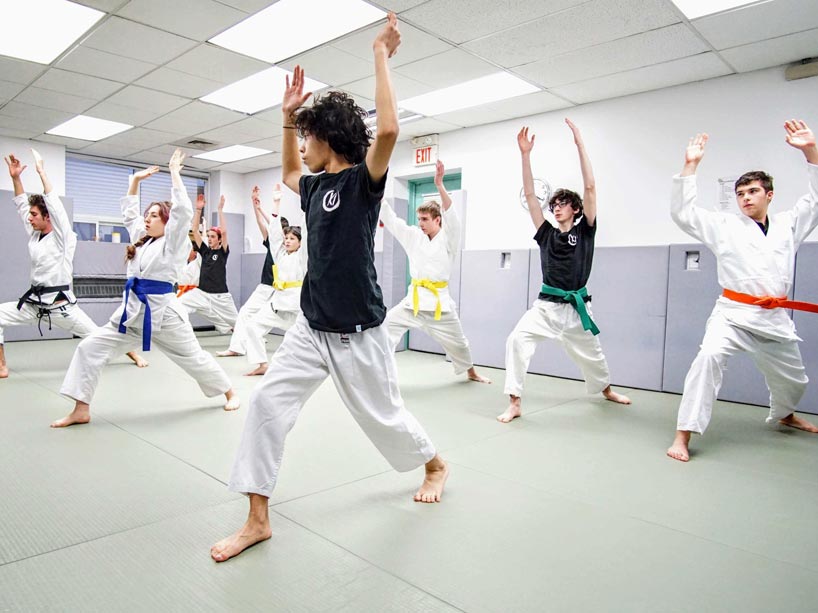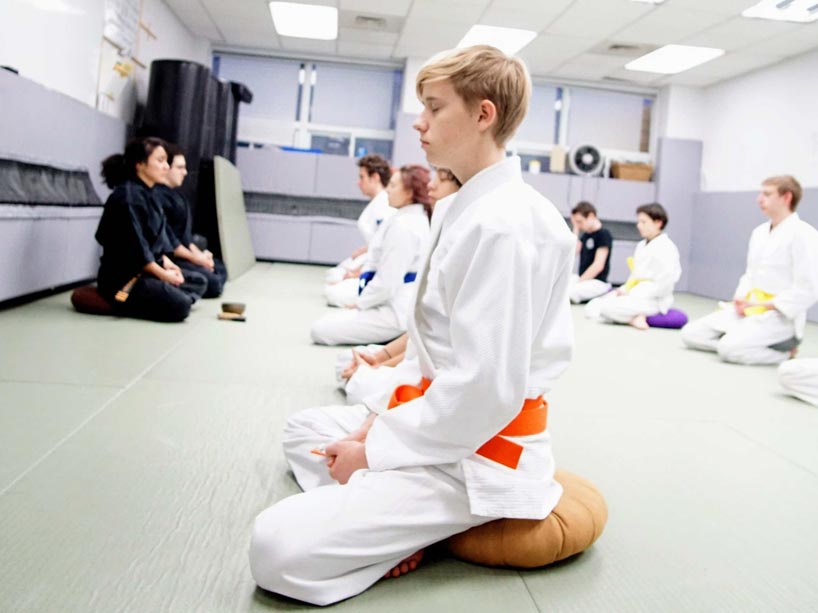How meditation and martial arts can help teens focus

A new study led by Ryerson University found that children with mental challenges who practice a mixture of martial arts, meditation and yoga can focus better on their tasks. Photo credit: Kanchan Maharaj.
A new study led by Ryerson University suggests teens with learning disabilities and mental health challenges practising a mix of meditation, yoga and martial arts can focus better. What’s more, results suggest that these changes are occurring at the brain level.
Karen Milligan, a professor of psychology in the Faculty of Arts, embarked on the four-year study, largely funded by the Scottish Rite Charitable Foundation, which examined the neural impact of Child Development Institute’s (CDI) Mindfulness Martial Arts program (MMA).
Since the early 2000s, CDI has been running the 19-week program designed to help youth with learning disabilities and mental health challenges manage their behaviours such as ADHD, anxiety and depression. Taught by instructors with expertise in mental health and martial arts, the program integrates martial arts and yoga training with mindfulness meditation and elements of cognitive behaviour therapy.
“Kids with learning disabilities are smart but learn differently,” said Milligan, who is the principal investigator of the study, titled “Impact of Mindfulness Martial Arts Training on Neural and Behavioral Indices of Attention in Youth with Learning Disabilities and Co-occurring Mental Health Challenges” and published online this month in the journal, Mindfulness (external link) . “We not only need to accommodate how they learn best in school to help them succeed with reading, writing or math, we also need to adapt the therapy to how they learn best.”
When Milligan started as the director of research and psychology at Integra Foundation (which amalgamated with CDI in 2014), she could see first-hand the positive impact the program was having on the youth and their families. After leaving CDI in 2012 to teach at Ryerson, the professor was curious to see if these changes were happening at the neural level and decided to investigate further.
Joined by co-authors at McMaster University, CDI, Brock University and Mount St. Vincent University, the researchers met with 48 MMA participants and their parents and 38 youth and parents waitlisted for the program. The youth, on average, had a combination of two or more learning disabilities and mental health challenges, the most common being ADHD, followed by anxiety, behavioural problems, depression and autism.

Youth with mental challenges who meditate, practice martial arts and do yoga seem to improve their ability to stay on task. Photo credit: Kanchan Maharaj.
In the study, the children-parent pairs were asked about the youths’ mental health and attention. The researchers also measured the electrical activity in the youths’ brains by running an EEG while the youth performed computer tasks requiring them to focus their attention. Both children in the MMA and waitlist groups completed these computer tasks before and after the program. In addition, the MMA participants performed the same tasks three months later in a follow-up meeting.
The researchers found, among other results, that the youth who took the MMA program paid better attention to critical information in tasks at the neural level, even three months after they finished the program.
“This result is significant because there is a positive change happening at the brain level, and that’s really interesting,” said Milligan. “It’s that plasticity of the brain idea. We actually may be altering some of that firing that is happening in the brain. If we can do that, we can potentially make more long-lasting changes.”
Samantha Yamada, director of program development, research and quality improvement at CDI, agreed. “Recent research has confirmed that during adolescence, the brain undergoes a period of rapid development where unused brain pathways are “pruned” and well-used brain pathways are strengthened. Milligan’s finding helps to validate that this program is influencing the capacity of these youth to engage in critical tasks at a biological level.”
This result also confirmed what parents shared anecdotally with researchers and in previous research on the MMA program. Many noticed their children being able to work on their homework for longer periods. The students were also getting along better with their siblings and there were fewer angry outbursts.
So, what does this finding mean for these children and their academic learning? For Milligan, it comes down to attention. “To me, attention is that core foundation from which kids can make many positive gains. It sets the stage for problem solving and goal setting. If they can pay attention and stay present with what is challenging them, they can work towards starting to achieve their goals in academics and in life.”
Jack Manchester, an instructor in the MMA program who has a black belt in martial arts, says the study re-affirmed how the program has helped his students understand that they can have influence over the way they experience distress.
“Students are learning tangible lessons on the mats of the dojo. They cannot learn how to regulate their emotions just by talking about it; they have to practise it. Milligan’s study is an exciting revelation because it shows that the program may have the potential to have a longer-lasting impact on their lives.”
Read the full study at link.springer.com/article/10.1007/s12671-019-01161-3 (external link) .